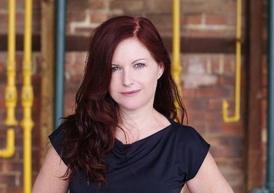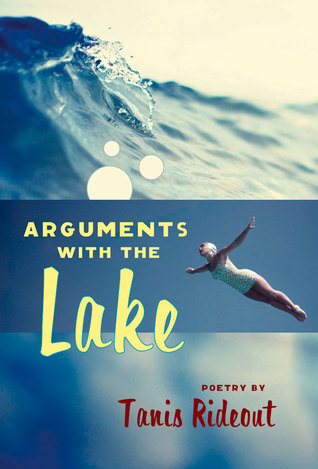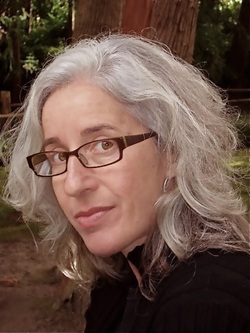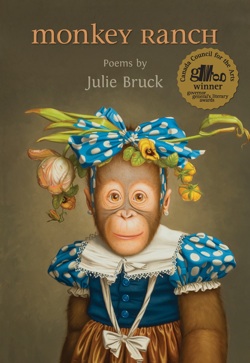RUSTY TALK WITH TANIS RIDEOUT Tanis Rideout’s work has appeared in numerous publications and has been shortlisted for several prizes, including the Bronwen Wallace Memorial Award and the CBC Literary Awards. Born in Belgium, she grew up in Bermuda and in Kingston, Ontario, and now lives in Toronto. Above All Things is her first novel. Tom Cull: What is your first memory of writing creatively? Tanis Rideout: I didn’t really start writing, at least as far as I remember, until quite late. I wrote for classes, of course, terrible poems for assignments, but I didn’t write for myself. I have very early memories of reading on long road trips out to the east coast, curled up in the trunk of our hatchback, something that I’m sure is very illegal now, but not writing. Rather when I was little I would play at being a scientist. I had a lab in my closet. I probably wrote some lab reports. Maybe that counts. TC: You are both a novelist and poet. Does each format require a different ways of thinking? Do your habits of mind or process change depending on whether you are writing poetry or prose? TR: I’m not sure that they so much require different ways of thinking, as they have slightly different foci. I use a lot of the same tools in both though. Language—the sound of it, the rhythm of it—is of fundamental importance to me in both realms, using it as the building block of voice, POV and the like. I think I bring that from the poetry world to the prose. I think voice and arc are things that I bring from the prose world and use them in different ways in poetry. What I will say is that I cannot write poetry if I’m not reading it. I think more in prose than in poetry for sure. TC: What is the best piece of writing advice that you’ve been given? Have you been given any bad advice? TR: The best advice—keep going. I sort of feel like the poster child for stick-to-it-ness sometimes. And for me, keeping going isn’t just about perseverance in general, but also about trying to keep pushing at the work, not letting it stand, but editing, changing, keep making it better, stronger both on specific projects and in the broader sense. The other really good piece of advice I got was from Joseph Boyden just as my novel was about to come out. He said, "You’re not one book. You better already be thinking about the next thing." Bad advice--maybe I just ignored it, or I had good teachers, because nothing is really coming to mind. Rather, I think I tend to know whether or not something will work for me, and if it won’t I don’t follow it. TC: Both your novel and your poetry collection are built on the architecture of historical fact—George Mallory’s third attempt to reach the summit of Mt. Everest inspires Above All Things, while Arguments with the Lake draws on the history of Marilyn Bell and Shirley Campbell, two teenage distance swimmers who rose to fame in their attempts to swim Lake Ontario in the 1950s. What is it that attracts you to history as a jumping off point for fiction? TR: I love history. I love historical fiction. I certainly think when I started writing, it was easier for me to see the drama in something far removed from me, from my immediate world, and I think there’s a component of fantasy in that kind of writing for me—exploring different times, thinking of who people might have been in those times. And they’re both such great stories: the possibilities they provided were exciting to me. I think with both those stories it was the character as much as the circumstances and setting that drew me in. TC: Both Above All Things, and Arguments with the Lake, are built on early-to-mid nineteenth-century tales of human attempts to triumph over nature. What do you find compelling about these narratives? Is the work of a writer analogous to the tasks your heroes set for themselves? TR: I think in some ways there is some comparison amongst swimming long distance, climbing, writing a novel. They’re all decisions that you have to keep making. You don’t decide to just do it and that’s it. You have to make the decision each day, with each stroke, each step. And I like how that’s also really what life is too—deciding each day, who you want to be, how you want to live. It’s all micro decisions. I think these human versus nature stories really appeal to me because they terrify me. Movies like K2 or Touching the Void—those are my horror movies. They scare me far more than zombies or haunted houses or what have you. How we pit ourselves against the world or try and live in it, whether we try to conquer it or embrace it, there’s something endlessly interesting about that. How powerless we are in the face of nature, and how deep that can make people dig. TC: In both of your books, geological entities (Everest, Lake Ontario) are more than simple features of the landscape—they become entities with whom your characters form intimate relationships. In the first pages of Above All Things, Ruth says to George, “tell me about this mountain that’s stealing you away from me.” Likewise, in Arguments with the Lake, we learn that Marilyn retires from competitive swimming, telling the papers that “there’s no room in a marriage for a lake.” How, in your work, does nature triangulate human relationships? TR: We’re intimately connected to place. It’s something I continue to think about. I lived in a number of landscapes growing up and I’m really interested in how those things inform us personally, artistically. And I think that we really only begin to understand ourselves and the world when we engage with landscape—this thing that is bigger than us, but that we’re a part of. I think narrative is connected to place and it’s the way I’m best able to understand landscape and environment. I’m not sure I can separate them out. TC: Your stories of nineteenth-century triumph over nature seem uncannily premonitory. I cannot, for example, think of the legacy of Mallory without also thinking about contemporary images of Everest as strewn with garbage and besieged by long lineups of rich thrill-seekers waiting for their chance to plant their flag. How do you understand these nineteenth-century narratives from our current moment of environmental collapse? TR: For me the past landscape and its treatment are absolutely connected to what they are today. You can see in the initial attempts on Everest these precursors to what it has become. Even at the time these were well-to-do men, who could take time away from work, pay most, if not all, of their own way to the mountain, etc. The notion of conquering, of owning, or taking over, is part of what I hope we’re starting to examine in terms of environmental consciousness now. I certainly was thinking about the current state of the mountain, or the lake, while I was writing, and wanted the work to hopefully gesture to that without being anachronistic, without spelling it out. But the men leave their trash there. The mountain is already becoming ugly and scarred by them. The remains of those expeditions still occasionally show up. TC: You do environmental justice work around Great Lakes water protection and preservation. How does this work inform your writing? TR: I’ve been doing work with Lake Ontario Waterkeeper for several years now. Arguments grew out of my relationship with them, with how they asked me to start thinking about the lake, to start taking ownership of it, responsibility for it. It’s something I think about a lot now, when travelling, when reading. It’s been a new lens through which I view how we interact with much of the natural world—where we live, how we build, who we create. I’m not entirely sure how this will continue to come out in my writing, other than to say that it’s something that is generally there in the back of my head and so inevitably percolates in some ways. TC: You are writer-in-residence at Western this year which entails, among other things, working with many young writers who learning writing fundamentals. Has helping these students made you reflect on your own writing? If so, how? TR: Writing is writing is writing. The tools are always the same. It’s actually been really fantastic to read other people’s work on a weekly basis. Regardless of skill level, when I read someone’s work closely and then sit to talk with them about where it could go, what might make it stronger, it’s then something that returns to me when I approach my own work. If I talk with someone about how their character needs to want something, I then realize, well, so should mine. Or if I’ve just chatted with someone about POV or tense or something, it’s then something I’m thinking about very specifically when I sit down again. TC: What are you currently working on? TR: I’m working on a new novel. There are no mountains or lakes in it. Well, not really. So far. TANIS RIDEOUT'S MOST RECENT BOOKS |
Rusty Talk
Rusty Talk Editor: Archives
November 2017
Categories
All
|




 RSS Feed
RSS Feed
